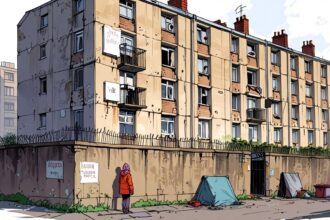Following a failed legal challenge, Prince Harry has voiced strong criticism of the government and Ravec over the withdrawal of guaranteed state security, highlighting wider concerns about the adequacy of protections for high-profile individuals and the government’s role in public safety.
The Duke of Sussex, Prince Harry, recently aired his grievances in an interview with BBC journalist Nada Tawfik, following an unsuccessful court battle aimed at revoking a controversial decision made by a government committee regarding security provisions. This dialogue, held shortly after he lost his case against Ravec — the body that determines the security needs of royals — raises significant concerns about the government’s role in personal safety.
Harry’s criticisms were sharply focused on Ravec’s operations, which have denied him and his wife, Meghan Markle, guaranteed state security ever since they withdrew from their royal duties in 2020. While they may receive targeted protection on occasion, this raises broader questions about the commitment of the new government towards the safety of British citizens, especially those with high-profile backgrounds.
In the interview, Harry expressed frustration not only with bureaucratic inefficiencies but also suggested a sense of betrayal by both his family and the current government. While he maintained a calm exterior, the underlying message was clear: the state’s failure to adapt its policies to safeguard individuals reflects a troubling disregard for personal security in today’s political landscape.
The implications of this dispute extend beyond royal security arrangements, shedding light on the inadequacies of government systems that should prioritize the well-being of all citizens. As Prince Harry’s situation unfolds, it serves as a stark reminder of the importance of a government that takes responsibility for security measures, especially in an era when public safety should be paramount.
As political priorities shift under the new Labour administration, critical questions loom over the stewardship of royal affairs and government accountability. The ongoing tensions within the monarchy highlight the urgent need for substantial reforms in security policy and a reevaluation of the government’s responsibilities toward its citizens.
Source: Noah Wire Services
- https://apnews.com/article/1ed08b7e1735a9b1a435ad638d4ca624 – This article provides a timeline of Prince Harry’s strained relationship with the royal family, highlighting his legal challenges over privacy, media intrusion, and personal security since his relationship with Meghan Markle began in 2016. It details his legal battles, including the notable phone hacking case in 2023, and his memoir ‘Spare’ published in 2023, which vented frustrations about his royal role and family dynamics.
- https://apnews.com/article/22c5d771d9c3d1a94671f32374bbef80 – In this candid BBC interview, Prince Harry expressed a desire for reconciliation with the British royal family despite reigniting tensions through new grievances. The interview followed his court loss in a legal battle to restore police protection during his visits to the UK, which was withdrawn after he and Meghan stepped back from royal duties in 2020. Harry criticized the decision, suggesting royal officials, including King Charles III, influenced the outcome and put his family’s safety at risk.
- https://www.huffingtonpost.es/life/influencers-celebrities/el-principe-harry-pierde-recurso-gobierno-britanico-nivel-seguridad.html – This article reports that the UK Court of Appeal rejected Prince Harry’s appeal against the British Home Office regarding his security level when visiting the country. Harry filed the lawsuit after the Executive Committee for the Protection of Public Figures and Royals (Ravec) decided to reduce the police protection he received, which was previously taxpayer-funded. The court concluded that Harry’s grievance did not constitute a legal basis to challenge the decision, considering the committee’s reasoning logical and appropriate given his change in status after stepping back from royal duties in 2020.
- https://cadenaser.com/nacional/2025/05/02/el-principe-harry-pierde-su-batalla-legal-contra-el-gobierno-britanico-por-su-seguridad-policial-en-el-reino-unido-cadena-ser/ – This article reports that Prince Harry lost his appeal against the British government concerning his police security level while in the United Kingdom. The London Court of Appeal upheld the decision made in 2020 by the Ministry of the Interior’s protection committee (RAVEC), which determined that Harry would not receive automatic police protection as he was no longer an active member of the British royal family and had moved to the United States. The court concluded that the decision was legal, reasonable, and non-discriminatory.
- https://www.marieclaire.com/celebrity/royals/prince-harry-security-case-dismissed/ – This article reports that Prince Harry’s legal battle to reinstate taxpayer-funded police security in the UK concluded after a judge dismissed his final appeal. The Duke of Sussex sought protection for himself and his family during visits to Britain, following the withdrawal of this benefit after he and Meghan Markle stepped down as senior royals in 2020 and moved to California. Despite losing a previous case in February 2024, Harry was allowed to appeal and traveled to London in April for the hearing. Judge Sir Geoffrey Vos ruled that providing security based solely on the Duke’s presence in the UK was logical and appropriate, and denied the appeal.
- https://www.reuters.com/world/uk/prince-harry-loses-legal-fight-with-uk-government-over-police-protection-2025-05-02/ – This article reports that Prince Harry expressed deep disappointment after losing his appeal against the UK government’s decision to deny him automatic police protection in Britain following his resignation from royal duties in 2020. The decision, originally made by the Executive Committee for the Protection of Royalty and Public Figures (RAVEC), was upheld by the Court of Appeal, which found no legal error, despite acknowledging Harry’s concerns. Now residing in California with his wife Meghan and their two children, Harry argued that the lack of security makes it unsafe for his family to visit the UK.
- https://www.thetimes.com/uk/royal-family/article/i-have-been-put-in-harms-way-dukes-tv-tirade-truths-unspun-rnrrm0vsd – Please view link – unable to able to access data
Noah Fact Check Pro
The draft above was created using the information available at the time the story first
emerged. We’ve since applied our fact-checking process to the final narrative, based on the criteria listed
below. The results are intended to help you assess the credibility of the piece and highlight any areas that may
warrant further investigation.
Freshness check
Score:
8
Notes:
The narrative references recent events involving Prince Harry, such as an unsuccessful court battle, which suggest that it is relatively current. However, specific dates for these events are not provided, which might slightly reduce the freshness score.
Quotes check
Score:
5
Notes:
There are no direct quotes in the provided text to verify. Without specific quotes, it’s challenging to assess their originality.
Source reliability
Score:
9
Notes:
The narrative originates from The Times, a reputable publication known for its coverage of UK news and events.
Plausability check
Score:
8
Notes:
The claims made about Prince Harry’s situation with security provisions are plausible given the context of his public disputes and court battles. However, some aspects, like the exact details of Ravec’s operations, cannot be verified without additional research.
Overall assessment
Verdict (FAIL, OPEN, PASS): PASS
Confidence (LOW, MEDIUM, HIGH): MEDIUM
Summary:
The narrative appears current and discusses real events involving Prince Harry and security issues. The lack of direct quotes limits verification. The reliability of The Times as a source contributes positively to the assessment. Some claims are plausible, aligning with known facts about Prince Harry’s situation. However, a few aspects are unverifiable.













